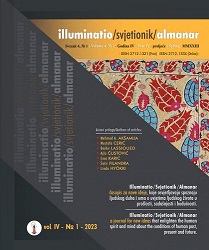U sjeni kvazi-salafi ideologije: Povratak prosvjetiteljsko – sunnitsko-sintetičkoj teologiji Imama al-Maturidje
In the Shadow of Quasi-salafi Ideology: A Return to the Enlightenment of Imam Al-Maturidi’s Sunni Synthetic Theology
Author(s): Mustafa CerićSubject(s): History of Islam, Contemporary Islamic Thought
Published by: Centar za dijalog - Vesatijja
Keywords: utopia; ṭūbāwiyyah; khilāfet; al-salaf al-ṣāliḥ; Imām al-Māturīdī; faithful obedience (ṭā’ah); explaination (bajān); Nakl - ‘Akl (coflict or synthesis);
Summary/Abstract: There is a consensus today among Muslim scholars: the Muslim global nation (Ummah) is in a big crisis. This crisis is similar to the two greatest crises in Muslim history: the crisis of the fall of the Abbasid caliphate in the 13th century and the crisis of the abolition of the Ottoman caliphate in the 20th century. The current crisis has different external and internal causes. The challenge for nations as well as individuals in crisis, is to discover which parts of their identities are working well and should not be changed, and which parts are no longer working and should be changed. Today, the Muslim Ummah, individually and collectively, needs the wisdom and courage to recognize what must be changed in order to cope with the new situation. But, at the same time, we must draw a line and emphasize the elements, which are fundamental to our religious, cultural and civilizational identities, which cannot be changed. The Muslim Ummah should not be directed towards the utopian idea of ṭubāwiyyah, i.e., a place that does not exist (no-where), but should be directed towards the idea of true faith and common sense, the way it was directed by Imām al-Māturīdī in the 10th century in Samarkand. Namely, Imām al-Māturīdī established a synthesis between Naql (Tradition) and ʿAql (Reason) in the real world of faith and reason, where they do not collide, but meet on the basis of success in this world (al-dunyā) and salvation in the Other World (al-ākhirah). In this paper, the author sheds light on the idea of synthetic Islamic theology of Imām al-Māturīdī in the spirit of Sunni-Hanafi teaching, the idea he elaborated in his doctoral dissertation in 1986 at the University of Chicago under the mentorship of Pakistani professor Fazlur Rahman (1919-1988). This idea may reflect the meaning of the word crisis: "to separate", "to decide", "to draw a distinction", and it could also mean a "turning point" from utopia to the reality of the contemporary history of the Muslim Ummah. So, let us begin again this historical journey from Samarkand with the spirit and mind of the Great Imām Abū Mansūr Muḥammad ibn Muḥammad ibn Maḥmūd al-Ḥnafi al-Māturīdi al-Samarqandī (d. 333h/944m).
Journal: Illuminatio/Svjetionik/Almanar
- Issue Year: 4/2023
- Issue No: 1
- Page Range: 58-97
- Page Count: 40
- Language: Bosnian, English

